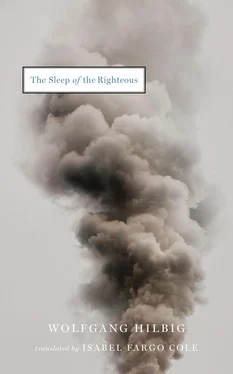When Grandmother died, it was decided without discussion that I, still a child, would move that same day to her vacated bed, next to my grandfather, so as to banish for good all clarity as to who had killed the old woman. And he, the old man, parted that day from his daughter. . she retired to the back, into my former room.
It was one of us two, that much is for sure: it was a blow from the cast-iron poker, descending with a thud to strike her on the hip, right between kidney and spine, a blow to which, after weeks of hunched shuffling and vomiting of black blood, she ultimately succumbed. How absurd that her end was ascribed to several prunes, soaked in cold water, which she was said to have eaten too greedily; it was the farcical justification that we had all agreed to believe, and no one dared call it a cowardly fiction.
He who goes to bed first is the innocent one, for he can fall asleep. If the old man goes first, if he’s asleep already when I come, the strained, sustained groaning and snoring that rises from his rib cage won’t let me fall asleep, not until I grasp at last, hours later perhaps, its irregular rhythm, and am able in the pauses in which he seems to have died, so long and so stunned are they, to chime in with my own groans and snores, so that our two voices begin to prowl about each other. They seek to wear each other down in a continual game of questions and answers that suddenly breaks free of its confusion and becomes a game in which at synchronized intervals we accuse each other again and again. — Who? Whoo . . is the ever-repeated question concealed within one of these chest tones; and: You! Youu . . is the response that just as inevitably follows.
Sometimes I awaken with a start, bathed with sweat in a darkness that admits no concept of time, and even before I completely come to, the last of his emphatic replies enters my still-feeble consciousness so fiercely that I turn rigid with dread. For a moment, he seems to listen, but my wheezing question doesn’t come; he tosses with sinister force onto his other side, turning toward me, I can’t tell if his eyes are open, and before I can place the horror of that insistent you in my vaguely straying thoughts, I’ve fallen asleep again; he turns back onto the old side, I feel his back at my breast again, again we lie like the nested forms of two soup spoons, my hand once more touching his. And I feel how, full of fury, he awaits the judgment from my howling throat; over and over, with the tirelessness of a torturer, he’ll ask me the terrible question: Whoo. .? — Youu. .! I’ll reply. Whooo. . — Youuu. . — And so on, and it seems that sleep is assured to me till morning. It seems we both believe firmly in the reciprocal truth of our testimony.
But in reality we’ve both forgotten the true course of events, and we both think ourselves the murderer. Or both of us doubt that the murderer was the other. It’s a circling about a common guilt, it’s two ellipses of a double guilt no longer to be teased apart; night after night it grows menacingly into the dark and drives the viruses of the gloom into a frenzy. No doubt the survivor will be the murderer. . whichever of us two dies first will sink redeemed into his grave. . no doubt that’s why we hold our breath so often and so long. — The survivor, suddenly isolated, suddenly lacking his consort, lacking his accuser by his side, will fully grasp his guilt: while the innocent one sleeps forever, the guilty one shall never taste sleep again. Long, grinding thoughts will keep him awake. . the initiate with the power to keep silent is dead. The powerless one is left behind; fear will torment him, mistrust of all the neighbors whose unrest he senses more keenly in the short summer nights, when his voice can be heard through the open window on the street: how much longer can the preposterous tale of the prunes be maintained? There is no one left who knows when the plum trees in the garden were felled; when might someone ask whether that wasn’t before the old woman’s death?
Bad dreams will visit the survivor’s doze; at one point he’ll think his grandfather has come in; while he feigns sleep, the old man will turn his back, drop his trousers to his knees, seat the lean, unsightly bareness of his buttocks on the bed, shed his trousers all the way, and lie beside him with a groan, hands folded on his breast in the innocent hope of sleep. . meanwhile the one left behind will wrench his eyes open all the way and see that he’s alone. — Never again will they nestle against each other by turns, one’s back pressed to the other’s front, filling all the bends of the sideways position, hands clawed together, dealing out each other’s breaths, rhythmic in heat and gloom. — Again and again the survivor will dream the first day of solitude, dreaming every night anew the horror with which, waking, he grasps that his last question has gone without a reply. . until he hears the reply from the depths of his own breast: none but he can be meant, beside him the bed is abandoned.
Now the summer nights grow shorter and fiercer, his groaning and snoring hectic and ever louder, increasingly perturbed that the whole street, and the side streets as well, hear him circle himself with his indictments, hear him talk in his sleep, struggling for life and yet cursing himself, unable as he is to follow the old man into innocence.
The woman in her distant room knows nothing of all this. . and is my initiate all the same; she bore me and abandoned me to this hideously long life. She slumbers for me, all the deeper since I’ve grown up out of childhood. She’s oblivious of the cycle of the viruses, oblivious that close at hand the world’s guilt dreams of vengeance — one day I’ll move the block of night, one day I must roll it over her body.

Nothing new on Bahnhofstrasse! — These are the first words to occur to me upon arrival. With the word arrival , though, I’ve already said too much: there’s something so familiar in the soapy taste of the air that I wouldn’t dream of describing my walk into town as a return — I don’t think of myself coming back; I’ve never been away. No, I never really left the town, sometimes I fled it, that’s all: in truth it was the town that never really left me. The town took me over with its drab devastation, in which some perpetually stalled upheaval seemed in progress, an inexplicable upheaval. I always had this impression, long before the whole country’s upheaval, and it lingered after the country’s authorities had surrendered and fled, after the government and its closest vassals had been replaced: this town seemed in no way to confirm the changing of the system. In a past apparently impossible to fathom now, the town must have plunged into paralysis, and that collapse had survived the regime change.
For years I fled from the town, years that have sped from my grasp as though chased by the furies, and yet never passed quickly enough for me. These are all the years I can recall with ease, quite in contrast to those I spent here in this town. It’s as though in those other cities, the bigger, more attractive ones I chose to live in, I never really settled down. Those cities’ easily summoned images were dimmed by a sense of loss, a sentimental feeling originating in this town to which I return from time to time. It’s here that this barely explicable sense of absence grew on me, one I only really felt once I had settled down elsewhere with the more or less firm resolution to stay. It made itself felt as a kind of living without a background, it was a state of severance, a state without a past, and yet I’d learned to feel severed from the past in the small town afternoons.
Читать дальше













